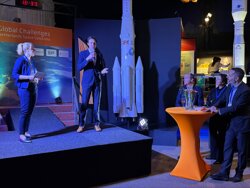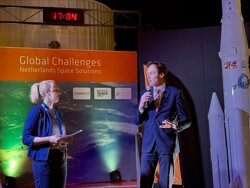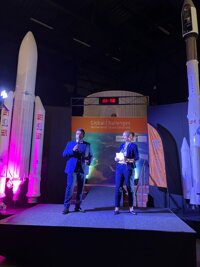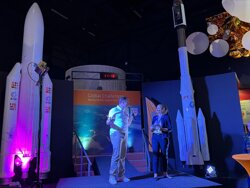Space Year 2025: Full of Ambition for Safety and Economy
What will the space year 2025 bring us? This topic was actively discussed during last week's NL Space New Year gathering at Space Expo in Noordwijk.
The entire Dutch space sector reflected on the past year during the traditional New Year's event hosted by industry association SpaceNed, Netherlands Space Office and NL Space Campus, on January 30 at Space Expo in Noordwijk. But more importantly, the conversation focused on the future. Surrounded by rocket engines, satellite models, and a spherical projection of impressive satellite data, attendees discussed the
Q&A with NSO director Harm van de Wetering
Long-Term Space Agenda, the development of the NL Space Campus, and the commercial opportunities that international space programs offer Dutch businesses.
At a Political Crossroads
On a political level, we find ourselves at a crossroads, as noted by NSO Director Harm van de Wetering in his speech. "Our safety is no longer guaranteed. The competitiveness of the European Union is a growing concern. And there are the effects of climate change, which we will increasingly feel. What makes space essential is that it can make a meaningful contribution to addressing these challenges. It’s up to us to fully leverage the opportunities space offers."
Strategic Autonomy
2025 is the year of the ESA Ministerial Conference. During this conference in November, ESA member states will decide which programs 
Talking about the ambitions of 2025
to invest in for the next three years. In parallel, the European Union is working on a new, more ambitious program. This provides many opportunities for the Netherlands, especially in several important strategic areas. Space is not just about outer space itself; it is much more about safety and prosperity in our daily lives on Earth.
This year, CGI, in collaboration with Defence, AIVD, IenW, and NSO, is developing a prototype of a PRS receiver. This special receiver will allow access to the secure signal from Galileo navigation satellites, providing even more precise and reliable positioning. And that is crucial for our security, says Van der Hoeven, Director of CGI: “The key topic going forward is strategic autonomy for Europe. With this receiver, the Netherlands can make a significant contribution to that.”
Investing in Ambition
Exactly one year ago, during the 2024 New Year’s event, former Minister Maria van der Hoeven presented the Long-Term Space Agenda (LTR). This outlines Dutch space ambitions for the next ten to fifteen years. Van der Hoeven hopes we will see the first concrete developments of the LTR this year: “What’s needed now? Concrete action. Making great plans is step one. Then you need to invest – both financially and in the people who can make our ambitions a reality.”
She finds an ally in Pim van Strien, former member of the Dutch House of Representatives and now the space councillor for the municipality of Noordwijk. He looks forward to the government’s response to the Long-Term Space Agenda and the subsequent parliamentary debate: “Space is crucial for our security, communication, prosperity, strategic autonomy, and sustainable future. We must convince parliamentarians to support the ambitions of the LTR with sufficient budget.”
A Campus Full of Opportunities
2025 is also expected to be the year of the NL Space Campus, predicts the campus’s director, Marc Sandelowsky. He is particularly looking forward to the opening of the new Comet Lab building in October. In the Comet Lab, students, businesses, and space experts will
Philip Thomas, Head of ScaleUp Programma Division, ESA
come together to work on our future in space and on Earth. They will do this, in part, at the Φ-lab (Phi-lab) of ESA, which helps bring promising concepts and technologies to the commercial space market. In 2022, NSO advised the government to invest in a Dutch Phi-lab. Following this advice, it was decided to house the facility at the NL Space Campus, where collaboration and innovation are optimally encouraged. "The Phi-lab will provide a strong boost to the commercialization of promising space technologies in the Netherlands," said Sandelowsky.
The Phi-lab isn’t the only program for commercialization at the NL Space Campus. The campus is also home to the ESA BIC space incubator for startups, as well as the ESA Technology Broker program. Martijn Leinweber from the Space Business Innovation Centre in Noordwijk notes: “Everything comes together at the NL Space Campus. This is the place where companies can capitalize on opportunities by developing space technologies or, conversely, by applying space technology in other sectors.”
Save the Date for the Symposium
If the Netherlands is to succeed in the global, rapidly growing commercial space market in the coming years, entrepreneurs and knowledge institutions must aim higher, says Jeroen Rotteveel, Chair of the SpaceNed industry association: “The Netherlands is extremely good at space, but we’re really bad at being proud of what we’re doing and showing it to the world.”
Jeroen Rotteveel shares save the date for Amsterdam Space Symposium
To showcase what the Dutch space ecosystem is capable of, SpaceNed are organizing the Amsterdam Space Symposium. Special attention will be given to topics of security and climate. Although the symposium will take place in 2026, Rotteveel urged all attendees to already reserve March 3 and 4, 2026, in their calendars. Registration for the Amsterdam Space Symposium will open this spring, and around 1,200 visitors from around the world are expected.
Learn more
Strenghtening Space Expo and NL Space Campus
Amsterdam Space Symposium